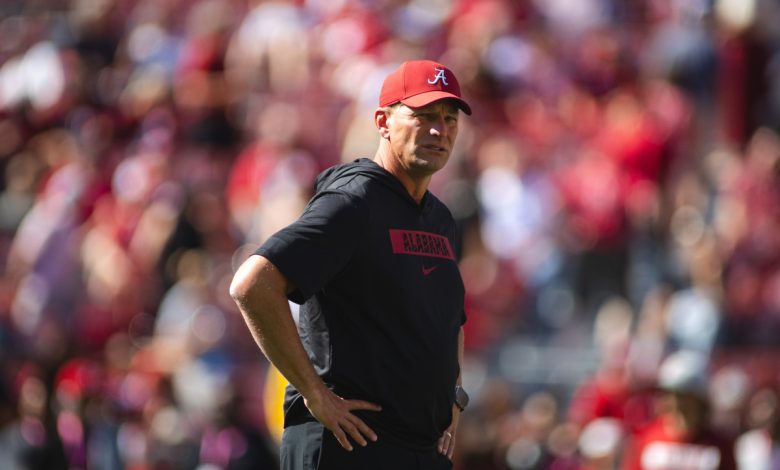The former Alabama standout expresses strong opinions on college football having elite teams like the Crimson Tide during Nick Saban’s time.

The landscape of college football has always been dynamic, with teams rising and falling in prominence based on talent, coaching, and leadership. However, one team has consistently dominated the sport for more than a decade: the University of Alabama Crimson Tide under legendary head coach Nick Saban. During Saban’s time at the helm, Alabama has become the gold standard for success, producing numerous national championships, NFL draft picks, and All-American players. The sustained excellence of Alabama, especially during the height of Saban’s career, has set a bar that few programs can even approach.
In recent years, there has been increasing discussion about the evolving state of college football, with debates surrounding the changing landscape of recruitment, the introduction of the College Football Playoff (CFP), and the general competitiveness of major college football programs. Amid this backdrop, former Alabama standout and NFL player Mark Ingram, a former Heisman Trophy winner and key player on Alabama’s national championship-winning teams, has voiced his strong opinions on the state of college football, particularly when it comes to elite programs like Alabama.
In this article, we will explore Ingram’s perspective on college football’s elite teams, focusing specifically on Alabama’s dominance under Nick Saban. We will examine how Ingram views the program’s role in shaping college football, the challenges to maintaining elite status, and what it means for college football to have a true powerhouse program in the modern era.
The Rise of Alabama Under Nick Saban
Nick Saban took over as the head coach of Alabama in 2007, and his impact was immediate. In just his second year, he led the Crimson Tide to an undefeated regular season and a spot in the Sugar Bowl. While Alabama didn’t win the national championship that year, it was a signal that Saban had restored Alabama to its rightful place among college football’s elite programs. The following year, the Crimson Tide went on to win the national championship, defeating Texas in the BCS National Championship Game, and the Alabama dynasty was officially born.
From there, Saban’s Alabama teams continued to dominate college football, winning six national championships (in 2009, 2011, 2012, 2015, 2017, and 2020) and consistently being a fixture in the College Football Playoff. The team became known for its suffocating defense, punishing running game, and a well-oiled machine of offensive and defensive schemes that could adapt to any opponent. Players such as Julio Jones, Derrick Henry, Tua Tagovailoa, and DeVonta Smith became household names, and Alabama continued to churn out top-tier NFL talent year after year. The recruitment pipeline Saban built allowed Alabama to reload instead of rebuild, making it nearly impossible for any other team to sustain the level of success they achieved.
Ingram, who played for Alabama from 2008 to 2010, was part of the early wave of players who helped solidify the foundation for Alabama’s modern dominance. Ingram’s Heisman-winning season in 2009 and his contributions to the 2009 national championship team helped set the tone for future success. During his time at Alabama, the program was undergoing a transformation, and he had a front-row seat to what would become a dynasty.
Ingram, now an NFL veteran, has spoken openly about his time at Alabama, often reflecting on what made the program so special under Saban. It’s clear that Ingram views Alabama’s sustained excellence as something rare and unique in the world of college football.
The Changing Landscape of College Football
As college football continues to evolve, the structure of the sport has undergone significant changes in recent years. The College Football Playoff system, which replaced the BCS system in 2014, brought with it a more inclusive and competitive postseason. Teams from all Power Five conferences, and occasionally Group of Five schools, now have the chance to compete for a national championship.
While this system has provided more opportunities for teams to reach the playoff, it has also created a more competitive environment. The rise of other programs, like Clemson, Ohio State, and Georgia, has led to a perception that the gap between Alabama and the rest of college football has narrowed. The new NIL (Name, Image, Likeness) era has also impacted recruiting, with players now able to monetize their personal brands while still in college. This has added another layer of complexity to the recruitment process, with programs like Alabama needing to adapt to the new rules in order to continue attracting top talent.
For someone like Ingram, who witnessed Alabama’s rise to dominance during the early Saban years, these changes to college football can be seen as a challenge for Alabama to maintain its elite status. However, Ingram remains confident that Alabama can still thrive in this new era due to the program’s culture and tradition of success.
Ingram’s Strong Opinions on Alabama’s Legacy
Ingram is not shy about sharing his strong opinions on the state of college football and the place that Alabama occupies in it. In interviews and social media posts, Ingram has been vocal about the importance of having elite teams in college football and why Alabama remains an example of excellence. His thoughts echo those of many former players who have been part of the program’s success over the years.
1. The Importance of Consistency and Culture
One of the key aspects that Ingram emphasizes when talking about Alabama is the program’s ability to maintain a consistent level of success over the years. For Ingram, it’s not just about the talent on the field or the scheme on offense and defense—it’s about the culture of the program that Saban has cultivated over the years. Alabama has become a well-oiled machine, with every player buying into the idea that winning championships is not a matter of if, but when. The high standards for excellence are instilled from the moment a player steps onto campus, and this mindset carries over into every aspect of the program, from recruitment to game preparation.
“Nick Saban doesn’t just build good football teams,” Ingram said in an interview. “He builds programs that stand the test of time. Alabama doesn’t reload; they reload, and they make sure their next wave is just as strong as the last. That’s why they’ve been able to maintain dominance in a time when college football is more competitive than ever.”
Ingram’s words reflect the importance of consistency in college football. Teams may have a great year, but sustaining success year after year is what separates elite programs from the rest. Alabama’s recruiting, coaching, and development system have kept the program on top, even as other teams like Clemson, Ohio State, and Georgia have emerged as national contenders. Alabama’s elite status isn’t a fluke, and Ingram firmly believes that it is the program’s culture that enables them to stay on top.
2. Recruiting and Development
Another key point that Ingram frequently brings up is the importance of recruiting and player development. Alabama’s ability to recruit the best high school players in the country, regardless of position, has been a major factor in the program’s success. The Crimson Tide don’t just recruit the top prospects; they develop them into NFL-ready players, sometimes at an accelerated pace.
Ingram himself was an example of Alabama’s recruitment and development pipeline. Coming out of high school, Ingram wasn’t regarded as the top running back prospect, but under Saban’s coaching, he quickly became one of the best in the country. He credits much of his development to the work he did at Alabama, particularly under the tutelage of Saban and his staff.
“Alabama doesn’t just get the best players—they make them better,” Ingram said. “I came to Alabama as a good player, but I left as a Heisman winner and national champion. That’s the power of their system. If you buy in and put the work in, there’s nothing you can’t achieve.”
This philosophy of player development is something that has become a hallmark of Saban’s tenure at Alabama. The program has produced a steady stream of NFL talent, from quarterbacks to offensive linemen to defensive backs, and it continues to be a pipeline for the NFL draft. The combination of top-tier recruiting and effective player development ensures that Alabama remains competitive at the highest levels of college football.
3. Alabama’s Role in College Football’s Legacy
Ingram also expressed his belief that elite programs like Alabama are vital to the health and legacy of college football as a whole. While competition is important, having a team that sets the standard for excellence helps raise the level of play across the entire sport. For Ingram, Alabama is not just a successful program; it’s the cornerstone of college football.
“We need teams like Alabama to keep pushing the bar,” he said. “Without teams like Alabama, you don’t have a true measuring stick. That’s what keeps college football exciting and keeps teams motivated. If everyone is the same, there’s no reason to strive for greatness. Alabama gives you something to chase, and that makes the sport better.”
Ingram’s sentiment underscores the idea that having an elite program like Alabama helps elevate the entire sport. In a world where college football continues to evolve and new teams emerge as contenders, Alabama’s consistency sets a standard that others strive to meet. Whether it’s on the recruiting trail, in the classroom, or on the field, Alabama has shown that excellence is achievable through hard work, discipline, and a commitment to the team.









